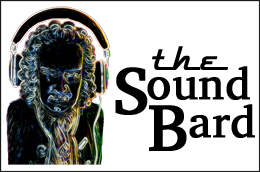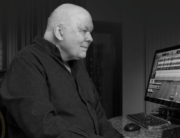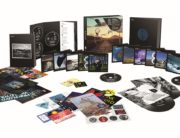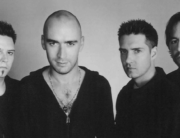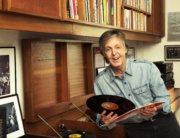BY MIKE METTLER – SEPTEMBER 20, 2016
Emerson, Lake & Palmer have always been at the forefront of sonic exploration, hi-res audio, and surround sound, going all the way back to the quad version of the live 1974 Welcome Back My Friends LP and especially the Dolby Surround mix supervised by John Kellogg for the first-ever studio version of “Pictures at an Exhibition” on Disc 1 of the 1993 box set, The Return of the Manticore. This really should come as no surprise, as ELP vocalist/guitarist/bassist Greg Lake (with guitar in the photo above) recently told me: “To be able to move a sound in space — that’s a magical thing, I think.”
Over the past few years, the early half of ELP’s catalog has seen some fine hi-res and surround sound treatment, with Steven Wilson helming the 96/24 stereo and 5.1 limited-edition mixes for 1970’s Emerson, Lake & Palmer and 1971’s Tarkus, while King Crimson’s Jakko Jakszyk took over for 1972’s Trilogy and 1973’s Brain Salad Surgery, the latter of which initially appeared as part of a 2014 BSS deluxe box set. A prior Brain Salad 5.1 mix appeared on a 2000 DVD-Audio release from Rhino, via a remix produced by John Kellogg and engineered and mixed by Paul Klingberg. That DVD-A also included “Lucky Man” as a bonus track, featuring Keith Emerson’s infamous Moog solo ping-ponging quite radically in the rear channels.
 More 5.1 ELP mixes from Jakszyk may eventually appear on the horizon, but in the meantime, the band’s core catalog is once again getting the deluxe reissue treatment, this time via Manticore/BMG. A three-disc collection, The Anthology, serves as a 39-track career-spanning sampler. Meanwhile, two-discs sets, each complete with outtakes and bonus cuts and priced quite reasonably, are being released in pockets of three. Already available are 1970’s Emerson, Lake & Palmer, 1971’s Tarkus, and 1971’s explosive live set at Newcastle City Hall in England from March 26 of that same year, Pictures at an Exhibition. On the studio recordings, you have the option of accessing the respective original album mix on Disc 1 as mastered by Andy Pearce and Matt Wortham, or cue up Wilson and Jacszyk’s alternate/current stereo mixes on each Disc 2, plus a selection of alternate and/or bonus tracks. (Unfortunately, the surround mixes are not included.)
More 5.1 ELP mixes from Jakszyk may eventually appear on the horizon, but in the meantime, the band’s core catalog is once again getting the deluxe reissue treatment, this time via Manticore/BMG. A three-disc collection, The Anthology, serves as a 39-track career-spanning sampler. Meanwhile, two-discs sets, each complete with outtakes and bonus cuts and priced quite reasonably, are being released in pockets of three. Already available are 1970’s Emerson, Lake & Palmer, 1971’s Tarkus, and 1971’s explosive live set at Newcastle City Hall in England from March 26 of that same year, Pictures at an Exhibition. On the studio recordings, you have the option of accessing the respective original album mix on Disc 1 as mastered by Andy Pearce and Matt Wortham, or cue up Wilson and Jacszyk’s alternate/current stereo mixes on each Disc 2, plus a selection of alternate and/or bonus tracks. (Unfortunately, the surround mixes are not included.)
Next up in the series, all due out on September 30, comes 1972’s Trilogy, 1973’s Brain Salad Surgery, and 1974’s Welcome Back My Friends to the Show That Never Ends – Ladies and Gentlemen, Emerson, Lake & Palmer, the latter of which was recorded during ELP’s 1973-74 Someone Get Me a Ladder world tour. (Bonus points if you recall which ELP song that tour’s name comes from — no Googling!)
To discuss all this magical ELP goodness, I Skyped with Lake, 68, across the Pond to discuss his views on surround sound and streaming, his days in King Crimson, and his earliest influences. Welcome back, my friend.
Mike Mettler: It’s nice to see the surround sound universe that swirls around Emerson, Lake & Palmer continues. What’s your opinion about surround, in general?
Greg Lake: I think it’s a fascinating concept. But, practically, it’s very difficult unless you’ve got the right circumstances for it. It’s not an easy thing to get absolutely right. But it has its uses, and its purposes.
Mettler: Right. The music you guys composed is perfect for that fuller kind of orchestral mix.
Lake: Yes. On the one hand, surround sound is an effect; on the other, it’s a great way to reproduce reality.
Mettler: That’s true. We live in a 360-degree world, after all.
Lake: Correct. That’s right.
Mettler: Is there one particular album of this reissues crop that has particularly excited you to revisit?
 Lake: It’s a bit like being asked, “Who’s your favorite child,” but if I had to choose one, the record would have to be Trilogy (1972). And the reason is, that’s when the band really secured its own identity. Technology was moving forward at an astounding pace as we made that record. The whole thing came together in one recording.
Lake: It’s a bit like being asked, “Who’s your favorite child,” but if I had to choose one, the record would have to be Trilogy (1972). And the reason is, that’s when the band really secured its own identity. Technology was moving forward at an astounding pace as we made that record. The whole thing came together in one recording.
Mettler: The surround mix Jakko did for Trilogy really makes me feel like I’m sitting in the middle of you guys as you were making it.
Lake: Yeah yeah, it’s nice.
Mettler: And how interesting is it that Jakko is now in King Crimson, singing some of the songs you did back in the very beginning of the band. [Lake was in King Crimson for the band’s 1969 debut album In the Court of the Crimson King, and you can hear his lead vocals on well-know KC songs like title track and “21st Century Schizoid Man.”] You and Robert Fripp [King Crimson founder/guitarist] grew up together, isn’t that right?
Lake: We did, yeah. We grew up together, we had the same guitar teacher, and we used to do our lessons together and practice together. For a long time, I was in a band, and Robert wasn’t. He used to follow me around, and he would do roadie-ing, and stuff. Saw him do that for a while. It was funny. (chuckles)
Mettler: Isn’t that something. I’m trying to picture that! And now he sits behind that stack of amps onstage.
Lake: After the original King Crimson, Robert took on a whole different tack, really — a whole different musical style. It was very… (pauses) abstract, I would say. Whereas the original King Crimson only had tinges of that abstractivity. At the heart of King Crimson, there was always songs. I also sang on the second album [1970’s In the Wake of Poseidon], as I recall. Nice album, it was.
Mettler: On the other side of the listening coin, certain ELP tracks have over 2 million listens on Spotify. As an artist, how do you feel about people streaming your music?
Lake: Well, look, on the one hand, I’m happy any time anyone hears or likes or appreciates anything I’ve done. That’s as an artist. As a businessman, I like to be paid for what I do! Records weren’t made for nothing. I spend my entire life making those things, and I don’t feel good if I’m not paid.
But on the other hand, from an artistic point of view, it’s not just about the money anymore. I’m gratified people will still play it, to be honest. I’d be worried if they didn’t. I certainly wouldn’t be getting any money then, would I? (chuckles)
Mettler: As we’ve said elsewhere, there’s a certain minstrel quality to some of your songwriting and your vocals. What were the influences on you growing up that may have led to that style of songwriting? I really feel you’re carrying on a certain tradition.
Lake: It’s very difficult to say. If I started rapping out names to you, they wouldn’t make sense. I could say Little Richard and I could say Judy Collins, you know? That’s how diverse they could be.
Mettler: But it does make sense, because that’s all in there.
Lake: Well, in a way, it is. Those artists were so great, in their way. I think most artists are like a sponge. We soak up different things. You won’t take everything from one place. You’ll take as an influence a little bit from here, and you’ll take some from there. You do it unconsciously — or at least, you should do.
I’ve never consciously sat down and tried to “copy” anybody. But I find myself, almost like a habit, just becoming a bit like that person, if you know what I mean. (chuckles) There’s a little bit of Little Richard in me somewhere. (chuckles some more)
Mettler: That makes me think of a track like “Are You Ready Eddy?” [from Tarkus], which shows your rockabilly chops. It’s all definitely there.
Lake: Yeah yeah; there are a couple like that. For many years, I played rock & roll in my early bands; it wasn’t progressive music at all.
Mettler: Your buddy Paul McCartney has a little bit of Little Richard in him too.
Lake: Yeah, yeah. I heard the other day Little Richard said something funny about Paul McCartney. He said he told him, “I taught you everything you know.” (both laugh) And McCartney said, “It’s true!” (both laugh some more)
Mettler: What was the first album you bought as a kid that excited you that still sticks with you now?
 Lake: Album? Well, it would have been a 78. (chuckles) That’s how old I am! It would have been a 78, and it would have been a record called “Diana,” by Paul Anka [released in July 1957]. I don’t even know why I bought it. I must have heard it. I went into a record shop, and I must have heard it and said, “Give me that one.” That was my very first.
Lake: Album? Well, it would have been a 78. (chuckles) That’s how old I am! It would have been a 78, and it would have been a record called “Diana,” by Paul Anka [released in July 1957]. I don’t even know why I bought it. I must have heard it. I went into a record shop, and I must have heard it and said, “Give me that one.” That was my very first.
And my second one was Little Richard, “Lucille” [released in February 1957]. That was the one that really started me off. It lit me up as a human being. I could just feel the energy in this thing. It was incredible. There was nothing like it. I had never heard anything like that. That was it. That was my first exposure to rock & roll. That was my first exposure to black music, really. Just an incredible eye-opening experience. Mind-opening.
Mettler: Have you ever met or spoken with Little Richard at all yourself?
Lake: You know, I never have. I regret that, because he’s one of the people we all have such high regard for. I would have loved to have met him.
 Mettler: Well, he is still around, so maybe someday you will. Speaking of sharing influences, I can remember when I was a kid and I took the ELP and Brain Salad Surgery albums to my grandparents’ house in Maryland and said, “Just listen to this music. You can’t categorize or quantify what it is, and I think you’ll like what I’m putting on.”
Mettler: Well, he is still around, so maybe someday you will. Speaking of sharing influences, I can remember when I was a kid and I took the ELP and Brain Salad Surgery albums to my grandparents’ house in Maryland and said, “Just listen to this music. You can’t categorize or quantify what it is, and I think you’ll like what I’m putting on.”
Lake: I agree with that. Music is either good or it’s bad, and it doesn’t matter what style it is, how old it is, who did it. Music is either from the soul or from the heart and it’s sincere, or it’s commercial trash.
Mettler: I played them songs like “Take a Pebble” and “Lucky Man,” and people who were 40-50 years older than I was at the time could relate to them and not have a predisposed opinion about liking them or not.
Lake: That was, of course, the success of The Beatles, wasn’t it? They were able to reach back in both directions, forwards and backwards, simultaneously. Quite incredible. Quite an incredible feat, really.
Mettler: Every generation going forward is going to discover what The Beatles have done, I think. And you’re at a point of having other generations discover your music too. One of the interesting bonus tracks to me [on Disc 2 of Tarkus] is “Oh, My Father.”
Lake: Strange, because it was never meant to be released. It was something I had made, but somebody dug it up. I don’t even know how they got hold of it. It appeared on a record before I was even aware of it. Because it’s not finished! (chuckles) It’s not even a finished record.
Mettler: Right. That solo at the end just kind of fades out.
 Lake: Yeah, yeah. It’s weird. I didn’t get to finish the record, and I never intended to. It was just something I did, really, for myself, when my dad died. It was personal. It wasn’t meant to be a record at all. But there you go. A lot of people tell me they like it.
Lake: Yeah, yeah. It’s weird. I didn’t get to finish the record, and I never intended to. It was just something I did, really, for myself, when my dad died. It was personal. It wasn’t meant to be a record at all. But there you go. A lot of people tell me they like it.
Mettler: Even those of us who still have our parents with us can directly relate to the emotion that’s going on there, what you’re singing. By the time you get to that solo, which sound like you’re using a wah pedal, I would have liked to hear what you would have done after that to finish it.
Lake: Yeah, well, so would I! (chuckles)
SoundBard postscript: Greg Lake passed away just four months following this interview on December 7, 2016 at age 69, following a long, private bout with cancer. His wonderfully personal autobiography, Lucky Man, was published posthumously in June 2017. Right before we ended our Skype connection, Lake said, “When the book comes out, let’s arrange something, and we’ll talk again.” Alas, that did not come to pass, but your words and deeds shall live on in our ears, hearts, and souls. Rest well, my friend.
